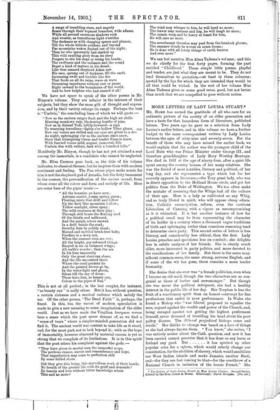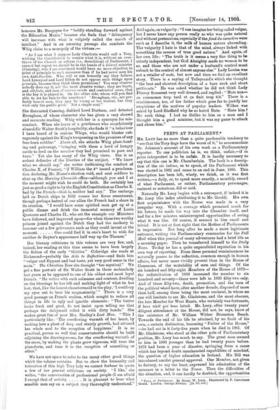MORE LETTERS OF LADY LOUISA STUART.* Mn. HOME has earned
the gratitude of all who care for an authentic picture of the society of an elder generation and have a taste for that hazardous form of literature, published letters. Two years ago he gave us a selection from Lady Louisa's earlier letters, and in this volume we have a further budget to the same correspondent written by Lady Louisa between the ages of sixty-nine and seventy-seven. For the benefit of those who may have missed the earlier book, we would explain that the author was the youngest child of the Lord Bute who was Prime Minister under George III., and therefore granddaughter of Lady Mary Wortley Montagu. She died in 1851 at the age of ninety-four, after a quiet life spent among the country houses of her many relatives. She was the friend of most notables, literary and political, of her long day, and she represented a type which but for her scarcely appears in literature,—the Toiy great lady, who was in direct opposition to the Holland House circle, and got her politics from the Duke of Wellington. We too often make the mistake of assuming that the Whigs had all the culture of their age. Here is a lady as cultivated as any Whig, and as truly liberal in spirit, who will oppose cheap educa- tion, Catholic emancipation, reform, even the cautious Liberalism of Canning, with a vigour as uncompromising as it is whimsical. It is but another instance of how far a political creed may be from representing the character of its holder in a country where a thousand vague traditions of birth and upbringing rather than conscious reasoning tend to determine one's party. This second series of letters is less literary, and considerably less ethical, than the first. Lady Louisa preaches and speculates less on conduct ; she delights less in subtle analysis of her friends. She is clearly much older, more interested in party politics, and more devoted to the ramifications of her family. But there is the same mag- nificent common-sense, the same strong, nervous English, and if some of the wit has gone, there remains a more tender humanity.
She denies that she ever was "a female politician, even when I became an old maid, though the two characters are as con- genial as those of barber and newsmonger." But though she was never the political intrigante, she had a healthy interest in the public life of her day. Her Toryism is less the fruit of a reactionary spirit than an honest contempt for fine professions that ended in poor performance. In Wales she found a Bishop who "was liberal, proposed to equalise the sees, argued against the wealth and power of the Church, and, being enraged against not getting the highest preferment himself, never dreamed of troubling his head about his poor paltry diocese. The illiberal prejudiced bishops come and reside." Her dislike to change was based on a love of things as she had always known them. " You know," she writes, " I was entirely neuter about the Cath. question, and now it has been carried cannot perceive that it has done us any harm or Ireland any good. But it has spirited up other popular cries for a reform, which would utterly change our constitution, for the abolition of slavery, which would annihilate our West Indian islands and make Jamaica another Haiti, and—for they are fast coming to that—for the overthrow of a National Church in imitation of the heroic French." She The Letters of Lady Louisa Stuart to Miss Louisa Clinton. Second Series. Edited by the Hon. James A. Home. Edinburgh : David Douglas. {21s. net.]
honours Mr. Burgoyne for " boldly standing forward against the Education Mania," because she finds that " delinquency will increase with what is vulgarly called the march of intellect." And in an amusing passage she combats the Whig claim to a monopoly of the virtues :—
" As I am what I suppose Lady Charlotte would call a Tory, wishing the Constitution to remain what it is, without an over- throw of the Church or reform (i.e., demolition) of Parliament, I cannot but regret we should be in the hands of a Liberal minister (Canning), who I am convinced would have no more objection in point of principle to such measures than if he had never seen his own Anti-Jacobin. Who will or can honestly say they believe Lord Liverpool and Lord Eldon do not oppose such things upon principle, because they think them pernicious ? You may observe nobody does say it, not the most abusive writer; they are bigots, and old fools, and men of narrow minds and contracted Mews, that is the key it is played in. On the other side, whom will you find able to set his face to the assertion ? Brougham, etc., are per- fectly honest men, they may be wrong or too violent, but they wish only the public good.' Not a single soul."
She distrusted Canning, disliked Lord Durham, and detested Brougham, of whose character she has given a very shrewd and accurate reading. Whig with her is a synonym for mis- conduct. When she hears of a gentleman who scandalously abused Sir Walter Scott's hospitality, she finds it " a behaviour I have heard of in zealous Whigs, who would bluster out- rageously against the King's trespassing on the premises of any free-born cobbler." Above all, she attacks Whig place-hunt- ing and patronage, " bringing with them a herd of hungry cattle to feed on the meadow they had promised to pare and burn." Yet she has many of the Whig views. She is an
ardent defender of the liberties of the subject. " We know what we should say," she writes (criticising the conduct of Charles X. of France), " if William the 4" issued a proclama- tion declaring Mr. Hume's election void, and sent soldiers to shut up the Morning Chronicle office—although you and I at the moment might wish he could do both. He certainly has just as good a right to by the English Constitution as Charles X. bad by the French—that is, neither had any." The embargo laid on Dutch ships in 1832 rouses her fierce resentment, though perhaps hatred of our allies the French had a share in its creation. "I would have some spirited man get up at a public dinner and drink the immortal memory of Louis Quatorze and Charles II., who set the example our Ministers have followed, and improved upon—for when these two worthy princes joined against the Dutch they had the modesty to hammer out a few grievances such as they could invent at the
moment One could find it in one's heart to wish for another de Reyter's appearance half way up the Thames."
Her literary criticisms in this volume are very few, and, indeed, her reading at this time seems to have been largely the fiction of the early "thirties." Coleridge she reads at Richmond—probably the Aids to Reflection—and finds him " vulgar and flippant and bad taste, yet very good sense in the main." The Christian Year she thought "too mystical." We get a fine portrait of Sir Walter Scott in those melancholy last years as he appeared to one of his oldest and most loyal friends. " He writes with such calmness and content, dwelling on the blessings he has left and making light of what he has lost, that, like the honest chambermaid in the play, ` I could cry my eyes out to hear his magnanimity.' " There is a very good passage on French realism, which sought to reduce all things in life to ugly and ignoble elements : " The butter looks fresh and good, do not insist upon telling me that perhaps the dairymaid rolled it with dirty hands." She makes great fun of poor Mrs. Shelley's Last Man. " This I particularly like : ' The overflowing warmth of her heart, by making love a plant of deep and stately growth, had attuned her whole soul to the reception of happiness.' It is so practical, proves so well that conservatories should be built adjoining the drawing-rooms, for the overflowing warmth of the stove, by making the plants grow vigorous, will tune the pianoforte, and tune it to the reception of something or other."
We have not space to refer to the many other good things which the volume contains. But to show the humanity and toleration of this high Tory lady we cannot forbear' to quote a few of her general criticisms on society. "I like," she writes, " the conversation of professional people (I am afraid
I except that of artists) It is pleasant to hear what sensible men say on a subject they thoroughly understand." And again, on vulgarity : "I can imagine her being called vulgar, but I never knew any person really so who was quite natural and without pretensions, especially if the /and du earactere were such as I describe it, the milk of human nature abounding. The vulgarity I bate is that of the mind, always linked with something the reverse of true good nature." And again, of her own life : " The truth is it seems a very fine thing to be utterly independent, but God Almighty made no woman to be so, and those who are not under a husband's control must submit to the control of almost anyone else." Lady Louisa was not a retailer of mots, but now and then we find an excellent story. There is a saying of Talleyrand's which she thought " the best and shortest description of a bare neck and short petticoats." He was asked whether he did not think Lady Fitzroy Somerset very well dressed, and replied : " Mails non— ca commence trop tard et ca finit trop tot." There is a reminiscence, too, of her father which goes far to justify her suspicions of the motives of popular leaders. Wilkes was asked by Lord Sheffield why he so hated Bute. " Hate him No such thing. I had no dislike to him as a man and I thought him a good minister, but it was my game to attack and abuse him."















































 Previous page
Previous page